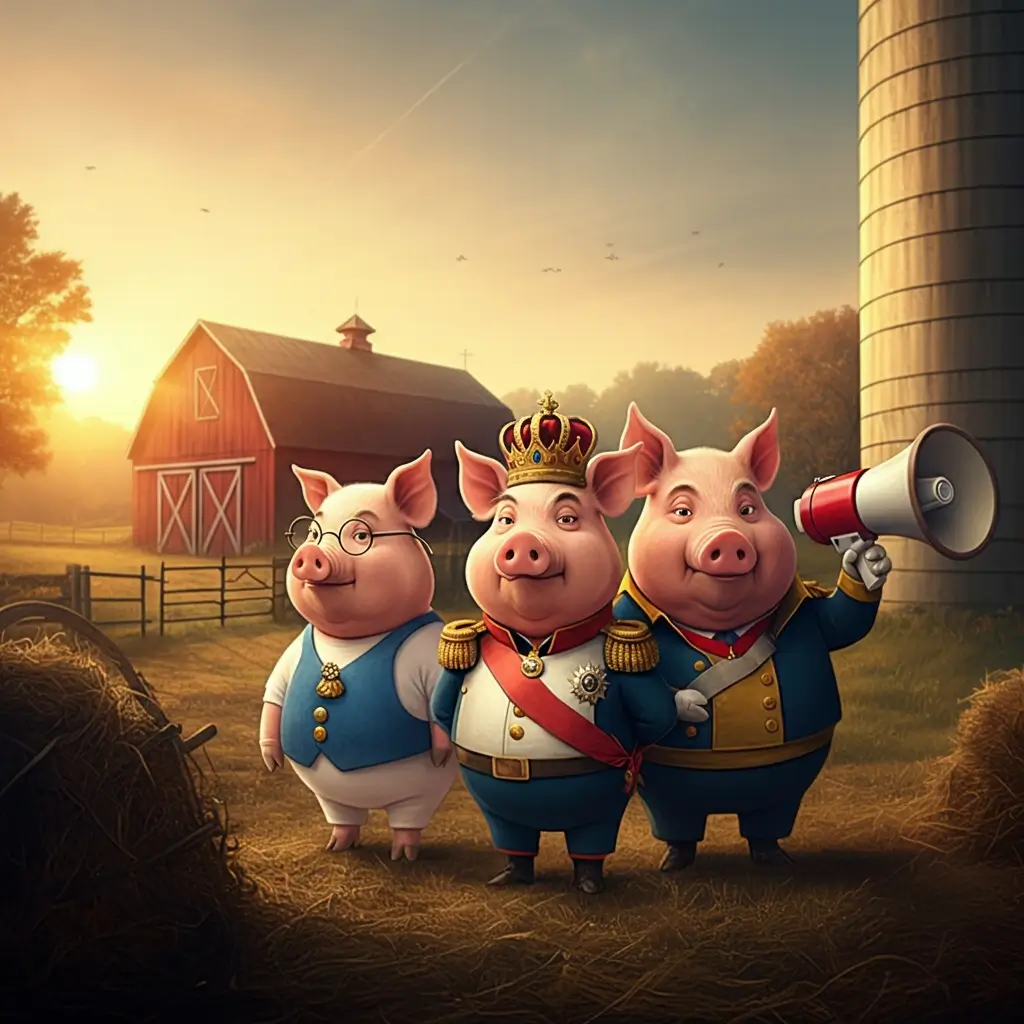Major Themes in Animal Farm
Orwell uses Animal Farm to convey crucial themes that transcend its narrative.
The Corruption of Power
Lord Acton’s famous saying, “Power tends to corrupt, and absolute power corrupts absolutely,” perfectly encapsulates the trajectory of Napoleon’s rise. What begins as a hopeful pursuit of equality descends into tyranny and oppression, demonstrating how those in power often manipulate systems for their gain.
Social Inequality and Class Struggles
The social disparity between the working animals (e.g., Boxer and Clover) and the elite pigs mirrors class struggles in real-world politics. Boxer, the hardworking horse, embodies blind loyalty to authority, and his tragic fate serves as a grim critique of exploitation under corrupt governance.
The Role of Propaganda
Squealer, the pig who serves as Napoleon’s minister of propaganda, is central to maintaining the pigs’ control. Through manipulation of language and distortion of facts, Squealer influences the animals’ perception of reality, showcasing the dangers of disinformation.
A Timeless Political Allegory
George Orwell’s Animal Farm is universally recognized as a brilliant and incisive critique of power and corruption. Labeled as a political allegory, the novella, published in 1945, remains a relevant piece of literature that sheds light on human greed, manipulation, and the betrayal of ideals. Whether you’re a student analyzing the text, an enthusiastic literature lover, or a book club member looking for meaningful discussions, this guide will provide a detailed overview of Animal Farm, exploring its themes, historical context, and literary significance.
Major Themes in Animal Farm
Orwell uses Animal Farm to convey crucial themes that transcend its narrative.
The Corruption of Power
Lord Acton’s famous saying, “Power tends to corrupt, and absolute power corrupts absolutely,” perfectly encapsulates the trajectory of Napoleon’s rise. What begins as a hopeful pursuit of equality descends into tyranny and oppression, demonstrating how those in power often manipulate systems for their gain.
Social Inequality and Class S
The social disparity between the working animals (e.g., Boxer and Clover) and the elite pigs mirrors class struggles in real-world politics. Boxer, the hardworking horse, embodies blind loyalty to authority, and his tragic fate serves as a grim critique of exploitation under corrupt governance.
The Role of Propaganda
Squealer, the pig who serves as Napoleon’s minister of propaganda, is central to maintaining the pigs’ control. Through manipulation of language and distortion of facts, Squealer influences the animals’ perception of reality, showcasing the dangers of disinformation.
Reliable Pet Care
Rooted in allegory, Animal Farm portrays a tale of rebellion, governance, and dystopia, all within the confines of a seemingly idyllic farm. The story is set on Manor Farm, owned by the indifferent Mr. Jones. When the animals, tired of their poor treatment, stage a revolt against Jones, they establish a self-governed society based on the principle that all animals are equal.
Under the leadership of pigs Napoleon and Snowball, the animals create the Seven Commandments to guide their new social order. However, cracks begin to form as Napoleon seizes power, exiles Snowball, and eventually becomes a tyrannical leader, indistinguishable from the humans the animals initially overthrew. The chilling twist is summed up in one of Orwell’s most famous quotes, “All animals are equal, but some animals are more equal than others.”
By the end of the novella, the animals discover that their fight for equality has merely replaced one authoritarian regime with another.
Historical Context
Animal Farm cannot be fully appreciated without understanding its historical underpinnings. Orwell wrote the novella as a response to the betrayals of the Russian Revolution. Led by Lenin and later manipulated by Stalin, the revolution promised equality but devolved into dictatorship. The events on Manor Farm mirror this tragic history, with Napoleon embodying Stalin’s totalitarian regime and its brutal suppression of dissent.
Orwell’s work also serves as a critique of how communist ideals can be subverted by the same greed and ambition they aim to eradicate. Written during World War II, Animal Farm was Orwell’s bold warning against the perils of concentrated power.
Character Analysis
Orwell’s characters in Animal Farm are intentionally crafted to represent key figures in political history.
Napoleon as Stalin
Napoleon is cunning, manipulative, and power-hungry. He leverages fear to eliminate his opponents and consolidate authority. Napoleon symbolizes Soviet dictator Joseph Stalin and serves as a warning against unchecked political power.
Snowball as Trotsky
Snowball represents Leon Trotsky, an idealist leader passionate about innovation and progress. His exile by Napoleon mirrors Trotsky’s ousting and subsequent assassination by Stalin.
Squealer as the Voice of Propaganda
Squealer is Orwell’s embodiment of propaganda. With his persuasive rhetoric, he convinces the animals to accept Napoleon’s increasingly oppressive policies, showcasing how skilled oratory can bend truth to serve those in power.
Boxer as the Common Worker
Boxer, with his naivety and tireless work ethic, represents the proletariat. His mantra, “I will work harder,” symbolizes blind faith in leadership, which ultimately leads to his exploitation and tragic demise.
Orwell’s Literary Devices in Animal Farm
Orwell’s use of literary techniques amplifies the novella’s impact, making Animal Farm a masterpiece of political literature.
Allegory
At its core, Animal Farm is an allegory of the Russian Revolution and the rise of Stalinism. Each character, event, and symbol reflects real-life political figures and ideologies.
Satire
Orwell employs satire to expose the absurdities and hypocrisy of authoritarian leadership. The pigs’ transformation into human-like figures is both darkly humorous and deeply symbolic.
Symbolism
Symbols like the windmill (representing industrial progress) and the Seven Commandments (laws distorted by those in power) enhance the thematic depth of the novella.
Where to Find an Animal Farm PDF
ooking to read Animal Farm for yourself? Many reputable websites and resources offer the novella in PDF format for free or purchase. Here are some reliable options:
Project Gutenberg (for public-domain works, depending on your region)
Google Books (for a paid version)
Your Local Library’s Digital Platform (e.g., OverDrive or Libby)
Always ensure the source is authorized to avoid pirated or unreliable copies.
Reception and Legacy
Upon its release in 1945, Animal Farm received widespread critical acclaim. While some dismissed it as anti-communist propaganda, most recognized Orwell’s nuanced critique of authoritarianism. To this day, the novella is frequently discussed in academic settings and remains relevant in political discourse worldwide.
Its legacy extends beyond literature; references to Animal Farm permeate pop culture, politics, and education, proving its enduring relevance in addressing power dynamics and social injustice.
Why Animal Farm Will Always Matter
At its heart, Animal Farm isn’t just a critique of a singular political system; it’s an exploration of human nature. Orwell’s timeless novella reminds us that the fight for equality and justice requires vigilance and accountability.
If you’ve enjoyed reading this guide, consider venturing further into Orwell’s works, including 1984, for more thought-provoking insights into politics and society.


